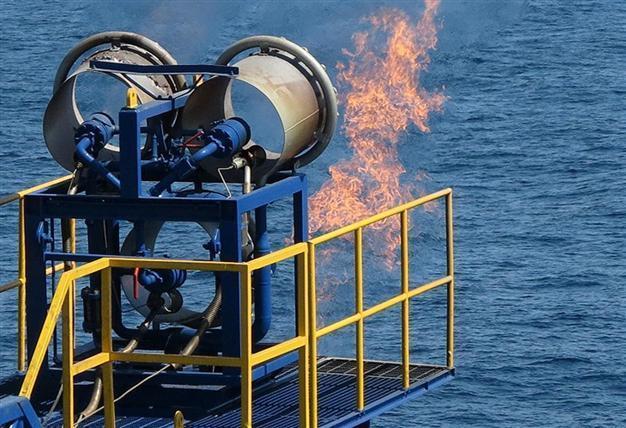Japan achieves to extract first methane hydrate gas
TOKYO - Reuters

Burned gas separated from methane hydrate gas is seen on the deep-sea drilling vessel “Chikyu” in the Pacific, off Aichi Prefecture, central Japan. REUTERS photo
A Japanese energy explorer said yesterday it extracted gas from offshore methane hydrate deposits for the first time in the world, as part of an attempt to achieve commercial production within six years.Since 2001, Japan, which imports nearly all of its energy needs, has invested several hundred million dollars in developing technology to tap methane hydrate reserves off its coast that are estimated to be equal to about 11 years of gas consumption.
State-run Japan Oil, Gas and Metals National Corp (JOGMEC) said the gas was tapped from deposits of methane hydrate, a frozen gas known as “flammable ice”, near Japan’s central coast.
Japan is the world’s top importer of liquefied natural gas and the lure of domestic gas resources has become greater since the Fukushima nuclear crisis two years ago triggered a shake-up of the country’s energy sector.
Methane is a major component of natural gas and governments including Canada, the United States, Norway and China are also looking at exploiting hydrate deposits as an alternative source of energy.
Japan used depressurisation to turn methane hydrate to methane gas, a process thought by the government to be more effective than using the hot water circulation method the country had tested successfully in 2002. Methane hydrate, is formed from a mixture of methane and water under certain pressure and conditions.
A Japanese study has estimated the existence of at least 40 trillion cubic feet (1.1 trillion cubic metres) of methane hydrates in the eastern Nankai Trough off the country’s Pacific coast, about 11 years of Japanese gas consumption. Japan’s LNG imports hit a record 87.3 million tonnes last year after Japan shut down most of its nuclear power plants following the Fukushima disaster.
















